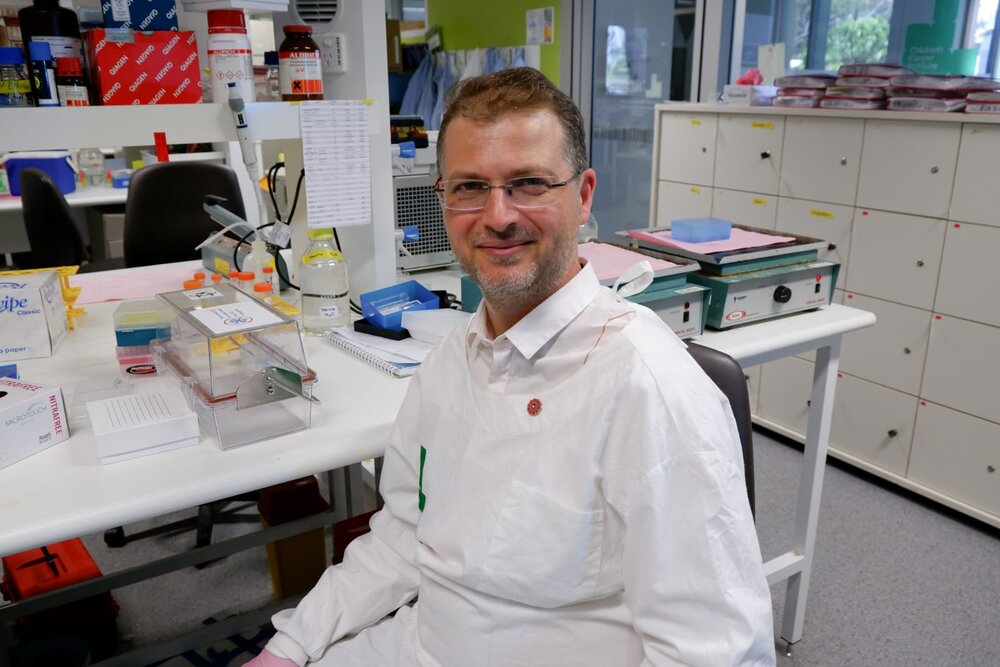A/Prof Orazio Vittorio

A/Prof Orazio Vittorio

Success: Breakthrough in childhood cancer research through blocking the copper uptake in tumours to boost the immune response
Cancer Type: Childhood Cancer
A/Prof Orazio Vittorio is a Team Leader in the Metal-Targeted Therapy and Immunology Group at Children’s Cancer Institute
Research success
Orazio received his first Cure Cancer grant in 2018 for his research into the study and development of drugs that target neuroblastoma and glioblastoma cells, and which have fewer side effects than conventional chemotherapies.
Neuroblastoma and glioblastoma are aggressive childhood cancers for which survival rates are poor, despite the use of intensive therapy. Neuroblastoma accounts for 15% of total childhood cancer deaths and sadly glioblastoma has the worst survival rate of all cancers, with only 5% of children surviving 5 years past their diagnosis. For those who do survive, quality of life is often compromised. Many former patients must deal with debilitating side effects of treatment for the rest of their lives.
Neuroblastoma and glioblastoma tumours are known to ‘feed’ on copper, often having up to six times the normal levels of the metal inside the tumour cells. Orazio’s initial research project examined the efficacy of targeting copper in cancer cells. He and his team developed a compound (dextran-catechin) which can kill cancer cells with high copper levels and is less toxic than chemotherapy treatments.
Novel breakthrough
Whilst immunotherapy (a treatment that works through a patient’s immune system to kill cancers) has proven to be a breakthrough for many cancer patients, cancers like neuroblastoma and glioblastoma camouflage themselves from current immunotherapies.
In 2020, Orazio and fellow Cure Cancer Alumna Prof. Maria Kavallaris made a significant breakthrough, discovering that, by removing copper from the blood, you can destroy some of the deadliest cancers that are resistant to immunotherapy. These findings were published in ‘Cancer Research’, a prestigious journal of the American Association for Cancer Research.
Orazio and colleagues studied tumour samples from more than 90 patients with neuroblastoma and 90 patients with gliomas. According to Orazio, these two cancers express a protein known as PD-L1 as a way to hide from the immune system, explaining why they are so deadly. By looking at the human biopsies, the researchers found a correlation between high levels of copper and increased expression of PD-L1. The researchers then showed for the first time in trials that copper levels could control the expression of PD-L1 in cancer cells. Therefore, by reducing the levels of copper within the cancer cells, the tumours are no longer able to hide from the immune system and thus the cancer can no longer thrive.
The next stage would be to take this research to clinical trial, with a long-term goal of establishing new therapeutic strategies to increase survival rates and improve the quality of life of patients.
The research has the potential to change how children with neuroblastoma and glioblastoma are treated, eliminating the need for chemotherapy and decreasing long-term side effects.
The need for funding
Orazio says that this breakthrough would simply not have been possible without the funding he received from Cure Cancer. “Novel ideas rarely receive the funding they need. I count myself extremely lucky to have been funded by Cure Cancer as they were instrumental in kick-starting my research career. At the same time, it is frustrating to know that so many young researchers with promising ideas are not able to explore them. The only thing that can improve the outlook for cancer patients is more funding for novel research.
“Breakthrough research cannot happen without funding. The support I have received from Cure Cancer has been vital in allowing me to achieve success with my novel research project.”
Together, we can cure cancer.
We take on every cancer
Cure Cancer funds ground breaking research across every cancer, no matter the size or rarity.
We aim to maximise our impact, save millions of lives, and leaves no one behind.

Our research grant program
We are dedicated to funding new innovative cancer research projects, giving talented emerging cancer researchers the opportunity to pursue their innovative ideas across diverse areas of cancer research.
Through our Research Grants Program, we commit to back new ideas from the most brilliant minds in cancer research.
Let's stay in touch
To receive updates on our work, campaigns and our impact in cancer research, subscribe to our newsletter.















